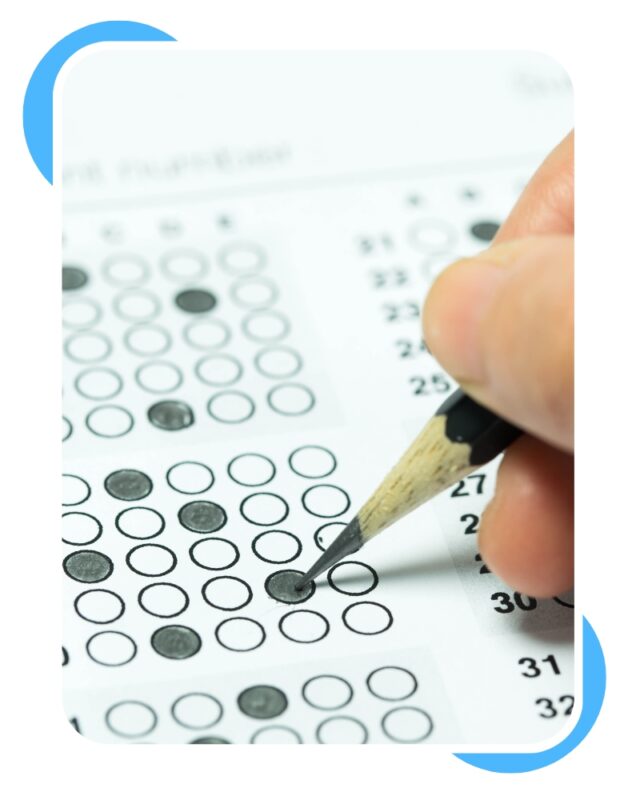
The Consortium of NLUs administers the Common Law Admission Test (CLAT) on a national basis for admission to the five-year integrated LLB (UG) and one-year LLM (PG) programs offered by the 22 participating NLUs. All 22 NLUs currently provide undergraduate programs, while 19 NLUs offer graduate programs.
The Consortium of National Law Universities, which consists of representative universities, organizes CLAT. The CLAT exam is used by several affiliated universities and organizations for recruitment and admissions, respectively.
NLUs performed CLAT in a rotating fashion up until 2018. However, starting in 2019, a permanent organization called the “Consortium of NLUs” that was created by NLUs will run the CLAT. The organization’s main office has located at NLSIU Bangalore.
In addition to the NLUs in India:
- The CLAT exam scores accepted by 61 additionally private associate universities.
- Some public organizations, including ONGC and BHEL, use CLAT-PG results.

CLAT Curriculum/Syllabus
The Consortium of National Law Universities (NLUs) distributes the CLAT syllabus to candidates so they are aware of the subjects and main concepts for the paper-and-pen exam. The CLAT syllabus will also assist you in:
Determine the crucial subjects
Verify the weight or distribution of points given to each topic by topic.
Knowing the subjects that make up the majority of questions of the CLAT can help you prepare more efficiently and improve your chances of succeeding. Check the subject-specific themes and question counts in the table below.
-
Current Affairs, including general knowledge
-
English language
-
Logical reasoning
-
Quantitative Techniques
-
Legal Reasoning
-
The portions on legal reasoning and current events give the most weight.
-
The English and Logical Reasoning parts are the next most crucial ones.
-
Quantitative Techniques is the least significant section.
-
Although each area has a different weightage, pay attention to each one.
-
Constitutional law, contracts, torts, criminal law, international law, intellectual property rights, and more are among the law-related topics covered in CLAT LLM questions.

CLAT Exam 2023
Application Starts on 1st January
Application Ends on 9th May
CLAT 2022 Exam date – 19th June 2022 & 18th December 2022
Results of CLAT 2023
The CLAT 2022 Result was made public by the organization in charge of the exam. Candidates can get their results by entering their name and roll number. It was declared on June 24, 2022.
Results include all pertinent information, including the candidate’s name, roll number, total marks, percentage, and result status (pass or fail).
Law entrance exam
In India, formal legal education is mostly provided at the undergraduate and graduate levels. Students who have finished their secondary education in the academic year 2022–2023 will be entitled to enroll in the integrated LLB programme, which offers a variety of undergraduate law courses.
Similarly, 3-year LLB and LLM programmes are offered to graduate students. In India, there are more than a thousand law schools. However, entrance tests for law are required for admission to the best schools and universities. Because of this, prospective law students should be aware of the entrance tests for these universities’ top-ranked law schools.
Thousands of students take part in some of the most well-known law entrance examinations in 2022, including CLAT, LSAT India, MAHA CET for Law, and others, to get into some of India’s top law schools.
CLAT 2023 exam date
On August 8, 2022, the Consortium of National Law Universities made the announcement and the CLAT 2023 enrollment form. It has launched the CLAT 2023 examination portal, where applicants can sign up to receive the most recent information on dates, registration forms, pattern requirements, and curriculum. You can access the CLAT 2023 application form at the official website – consortiumofnlus.ac.in
The CLAT application form 2023 must be submitted by November 13, 2022. On December 18, 2022, the CLAT 2023 will be conducted in offline mode. For the first time, the Common Law Admission Test, or CLAT, will take place earlier than usual—in December rather than during the first week of May. It benefits the candidates in some aspects because CLAT won’t conflict with board exams. The applicants would have less time to prepare for CLAT 2023.
2023 CLAT Eligibility
According to the most recent guidelines established by the Consortium, there is no age restriction for taking the CLAT exam. If the applicants meet the minimal requirements, they may apply for CLAT 2023 regardless of age. Candidates must be aware of CLAT Exam Eligibility 2023 if they plan to take the forthcoming exam. Before submitting their application, candidates who want to study law at one of the best NLUs must confirm their eligibility with CLAT Eligibility 2023.
A candidate’s eligibility to take the exam will be determined by the CLAT Eligibility Criteria 2023. The specific eligibility requirements for the exam include compliance with the CLAT Age Limit, educational requirements, work experience, and UG and PG Eligibility Criteria. Candidates must review the CLAT Exam Pattern 2023 and make preparations based on the crucial subjects.
Current information on CLAT qualification for 2023
The latest revisions on CLAT Eligibility 2023, take note of the points below.
-
Candidates can apply for the CLAT Entrance Exam 2023, regardless of their age, under the Consortium of NLUs’ amended guidelines.
-
There are no restrictions on how many times a candidate can take the CLAT exam.
-
According to the CLAT Exam Eligibility, candidates who are NRIs, OCIs, PIOs, and Foreign Nationals are also eligible.
-
Keep in mind that CLAT Eligibility 2023 will be formally validated during final admission and counselling. Read through the CLAT 2023 Syllabus carefully to get ready for the forthcoming test.
CLAT Exam Pattern
The notification on the official website specifies the undergraduate and graduate levels individually. The applicants for the CLAT exam study the syllabus provided by the CLAT exam format. The CLAT syllabus has classified into five sections for the undergraduate level, including English Language, Current Affairs, which includes General Knowledge, Legal Reasoning, Logical Reasoning, and Quantitative Techniques.
Constitutional Law and other law subjects including contract, tort, criminal, international, intellectual property, and jurisprudence, make up the majority of the CLAT postgraduate level course.

Conduct to Examination
Let’s examine the CLAT exam structure at the undergraduate and graduate levels.
Undergraduate Level
The exam will be administered offline in accordance with the CLAT exam format. The applicants must respond to the computer-displayed question and submit their response by selecting one of the available answers.
Postgraduate Level
An online testing format will be used. 120 minutes will be given to answer 120 objective questions. In PG CLAT, there are no descriptive or essay questions.
Exam Format
The English language will be used to administer the exam. According to the study of the CLAT exam pattern published, applicants will not be permitted to answer the question paper in any other language. There will only be English-language questions on the undergraduate-level exam paper. Both multiple-choice and essay-type questions shall be asked on the postgraduate-level exam paper, and both will only be answered in English.
CLAT Exam Pattern – Exam Length & Format
Let’s examine the CLAT exam’s duration.
Undergraduate Level: According to the exam format for CLAT 2023, 150 multiple-choice questions will be given to the applicants, who have two hours to complete them.
Post Graduate Level: These will be multiple-choice questions that are objective in character. The CLAT PG question paper will have 120 multiple-choice questions according to the most recent CLAT exam pattern. The question paper must be answered within two hours by the applicants.
CLAT Exam Pattern: Important Aspects
-
The CLAT exam pattern underwent another substantial change that involved a decrease in the number of questions. Students can anticipate 150 questions and a total of 150 marks in CLAT 2023.
-
As stated by the consortium in a recent statement, the CLAT exam will be administered in pen and paper format.
-
The exam’s duration remains unchanged. The 120-minute CLAT 2023 will take place.
-
The shift in the CLAT pattern shows that the aspirant’s reading skills are under pressure. Students must be adept in inferential reasoning, and those who read frequently will do well on the CLAT.
-
The 450–500 word readings in the CLAT exam will each feature 5–6 questions.
-
Reading comprehension is essential because each segment contains passages and questions that are relevant to it.
-
To answer the questions well and on time, the candidate must read and comprehend the sections quickly.
-
Candidates must plan their time wisely to finish the test within the allotted time and accurately.
CLAT Helpline Number
On August 19, 2017, the Consortium of National Law Universities was founded with the goals of raising the country’s legal education standards and enhancing the judicial system through legal education.
To reach the greatest levels of legal education in the nation, the Consortium hopes to improve coordination across National Law Schools. The Consortium now has 22 National Law Universities as members.
To Contact the Consortium of NLUs
Email – clat@consortiumofnlus.ac.in
Contact number – 08047162020

FAQs for CLAT Exam
The exam is highly competitive, and candidates need to prepare well to succeed. Along with the preparation, having a clear understanding of the exam and its procedures is crucial. Here are some frequently asked questions related to the CLAT exam:
The Common Law Admission Test is known as CLAT in its complete form. For admission to 22 national law universities in India, candidates must pass the CLAT, a consolidated national-level government entrance exam. These results are also used for admission to law at the majority of privately funded and self-financed law schools in India. Additionally, CLAT Postgraduate scores are used to fill company legal positions by Indian public sector organizations, including Coal India, ONGC, BHEL, the Indian Steel Authority, Oil India, and others. For admission to integrated U.G. programs, the test is administered in law schools after the 12th grade or Higher Secondary Examination. It is also administered in law schools after graduation for the LLM (Law for Master of Laws) programme.
The CLAT 2023 application form was made available today, August 8, 2022, by the Consortium of National Law Universities (NLUs). The Consortium of NLU’S official website now accepts registrations for CLAT 2023. The CLAT 2023 application form submitted by November 13, 2022. The registration cost for CLAT in 2023 is Rs. 4,000 for applicants in the general category and Rs. 3,500 for candidates in the SC, ST, and BPL categories. Candidates must register and complete the application form to participate in CLAT 2023.
Such modifications to the CLAT exam format have not been made for 2023. However, CLAT will only be offered twice in 2022—on June 19, 2022, for CLAT 2022, and December 18, 2022. (CLAT2023). Two hours will be allotted for the exam’s operation.
Answers key CLAT 2022 – A CLAT 2022 final answer key can be appealed to until June 28, 2022, according to the Consortium of National Law Universities (NLUs) (3 pm). On June 23, 2022, available the final CLAT 2022 answer key. The CLAT 2022 answer key is available online at consortiumofnlus.ac.in
Yes, you can register for CLAT 2023 since you would, by law, pass your class 12th in 2023, making you eligible to register for CLAT UG 2023. This will be the first time CLAT is held so much sooner than it usually does, on December 18, 2022.
The popularity of the test is on the rise when the history of the CLAT test is followed from its conception to the present and expanded into the future (let’s say the next 10-15 years). The national law schools offer a secure foundation for launching a career in corporate law as the opportunity to do so grow in India.
The professional opportunities CLAT extends to the future will likewise accelerate as the legal profession, particularly corporate law, gains popularity. The current state of Indian law makes this the ideal time for passing the CLAT exam to enroll in one of the best law schools and secure a solid future with the promise of a competitive income.
